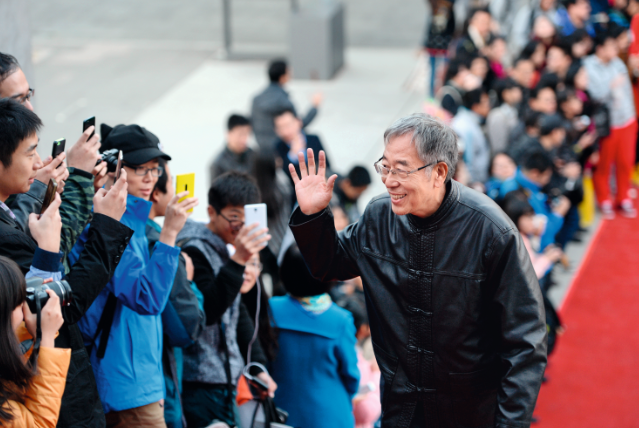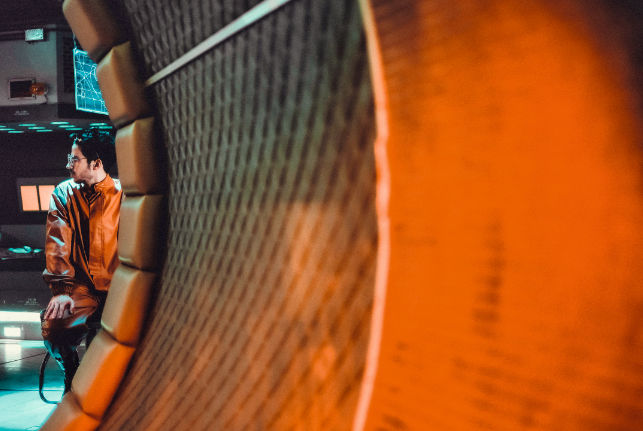A Thinker’s Guide to the Galaxy

China’s sci-fi community has reached a consensus: By the turn of the 21st century, Chinese science fiction was enjoying a renewed golden age.
Renowned sci-fi writer Wang Jinkang successfully led Chinese sci-fi literature to maturity during the period. In 2019, he was granted the Lifetime Achievement Award at the 30th Galaxy Awards, the highest honor for sci-fi writers in China. Over the years, Wang has won the Galaxy Awards 18 times in different categories. “He is a milestone of Chinese science fiction, marking the advent of an era of tremendous changes,” remarked the jury statement during his Lifetime Achievement Award presentation in 2019. “He uses his pen to depict the magnificent landscape of Chinese science fiction.”

Symbolic Debut
The emergence of Wang Jinkang as a sci-fi writer was by accident, but also a milestone event.
The motivation behind Wang’s sci-fi novel creation is interesting: Just like J.K. Rowling who started telling bedtime stories to her daughter before authoring the Harry Potter series, Wang also started by telling stories to his son.
However, satisfying his son’s curiosity was merely the spark for his writing career, and the fuel was love for science accumulating since childhood.
Wang was born in 1948 in a small town called Zhenping in Nanyang City, Henan Province. When he was a child, he learned from a popular science book that the seven colors of the rainbow derive from the impact of electromagnetic waves with different frequencies. “It felt like the colorful fairytale world in my heart suddenly collapsed and was replaced by a world of dry physics laws and numbers,” he recalled. “However, the latter fascinated me immediately with simple but inclusive beauty. From that moment on, I became a devout believer in science for life.” The experience also inspired a dream of becoming a theoretical physicist.
However, life didn’t go as expected. Wang didn’t become a physicist, and his first job had nothing to do with scientific research. After graduating from college in 1983, he was hired as an engineer at a petroleum machinery factory in his hometown. When he published his first novel in 1993, Wang was leading a heavy-duty truck research project at Nanyang Second Petroleum Machinery Factory.
That year, Wang’s 10-year-old son asked him for a bedtime story every night. After using up all the stories he knew from books, Wang began to create original stories. His son showed enormous interest in a particular sci-fi story he told, so Wang wrote it down to author a short story.
The internet wasn’t around yet in those days. Wang had no idea where to send the story after finishing it. One day, he spotted a copy of the magazine Science Fiction World at a roadside newsstand. However, he didn’t have enough money to buy the magazine, so he wrote down the publisher’s address on a piece of paper and then mailed the manuscript to its editorial department.
That short story ended up as Wang’s first sci-fi novel, The Return of Adam, which won First Prize at the Galaxy Awards in 1993. That year, Wang was 45 years old.
The Return of Adam is a short story with less than 10,000 words. The plot unfolds as such: Astronaut Adam Wang returns from a 202-year-long space mission to find Earth dominated by “neo-homo sapiens” with intelligent chips transplanted in their brains. Adam agrees to undergo a surgery to implant a chip in his brain because he believes the only way he will be able to overthrow the neo-homo sapiens is to obtain higher intelligence. Subsequently, however, he realizes it was an inevitable trend that “apes were replaced by human beings, and human beings were replaced by neo-home sapiens.” His desire to return to the past is like “the last old ape in the world refusing to use fire,” and he eventually realizes that all of his efforts are in vain.
Such a tragic, dystopian sensibility was retained in his subsequent works. Years later, Han Song, another leading Chinese sci-fi figure, called the emergence of Wang Jinkang a milestone in the country’s sci-fi history in an article, dubbing the publication of The Return of Adam a watershed moment that heralded the return of Chinese science fiction. It opened the floodgates to a new generation of Chinese sci-fi writers that took the stage one after another, reversing the decline of Chinese science fiction since 1983.
Lone Ranger in Sci-Fi
Back in the mid-1950s, Chinese science fiction witnessed a boom after the “March for Science” movement was launched. However, the genre fell into a decline after science fiction was criticized as “pseudoscience” in 1983. Consequently, many sci-fi journals were suspended, and Chinese science fiction fell into a dark age. “I didn’t realize how tough that time was for science fiction in China,” revealed Wang, “but I did feel lonely as a sci-fi writer.”
In 1995, Wang ventured to the Karamay Oilfield in Xinjiang Uygur Autonomous Region to experiment with some new products alongside four colleagues. Unfortunately, some key components of their equipment broke, and replacements would take a dozen days to arrive. Their work was suspended. While his colleagues killed the time by playing mahjong, Wang drafted The Song of Life, one of his representative sci-fi masterpieces, on an exercise book in a room smelling like oil to the clack of mahjong pieces hitting a table in the heart of the Karamay Desert.
Similarly to his debut novel The Return of Adam, The Song of Life discusses the philosophical question about how mankind should deal with a new species that has replaced them to dominate the world. The protagonist in The Return of Adam chooses to embrace the trend and accept mankind’s fate of being replaced. In The Song of Life, however, the protagonist chooses to kill the robots that gain consciousness to buy some time for the survival of human beings—even if it is inevitable that mankind will eventually be weeded out.
The Song of Life won the Special Prize at the 1995 Galaxy Awards. Yao Haijun, editor-in-chief of Science Fiction World, commented that the success of the novel was its ability to “introduce philosophy into science fiction while preserving the latter’s core values and making us see with delight and surprise the growing foundation of Chinese science fiction.”
As Chinese science fiction started thriving like weeds in the spring, Wang Jinkang catapulted himself to sci-fi legend status by capturing the Galaxy Awards for six consecutive years.
In 1999, Wang voluntarily bowed out of competition for the Galaxy Awards in hopes that “the sci-fi awards would encourage more young sci-fi writers.” That year, Liu Cixin, the author of the famous “Three-Body” trilogy, took First Prize at the Galaxy Awards for his novel With Her Eyes. That year’s Galaxy Awards also witnessed the emergence of other writers who later became important figures in China’s sci-fi circle.
Chinese science fiction has since entered another golden age.

Seeing the Future
through History
Wang Jinkang credited his ability to “see the future” to his tendency to look back upon the past.
Born in 1948, Wang endured many turbulent periods. He injected his profound, sincere understanding of life into his works. His novels are characterized by a calm, lonely writing style, deep and inspiring thoughts, and tense dramatic conflict. A combination of naturalism and humanism, most of his works feature an astonishingly tragic end.
Science fiction depicts futuristic worlds and serves as a “laboratory” from a cosmic perspective. The most common experiments conducted in the “laboratory” are all about imagination and interpretations of human doomsday, but different writers may deploy different methods and procedures. Essentially, Wang Jinkang’s “Life” trilogy—Crystal Egg of the Universe, Exodus from Our Mother Universe, and Heaven as Father, Earth as Mother—is about testing humanity. The trilogy depicts how human beings struggle to survive across various galaxies amid fear and despair caused by the collapse of intelligence as the universe suddenly expands.
Wang has argued that throughout the development of mankind, humanities such as religion, philosophy, and aesthetics have always advanced in tandem with sciences. Both humanities and sciences are invaluable fruits of human civilization, which help humans realize their insignificance in the vast universe and are capable of guiding, monitoring, and controlling mankind’s behaviors when doomsday comes. Only in this way can human beings shine a light of rationality and wisdom on mankind’s existential struggles.
In a 1997 novel, Wang envisioned a scene in which artificial intelligence beats the greatest human chess player. That became reality 20 years later when AI-based AlphaGo defeated the world’s top Go player Ke Jie. “History shows that all things will definitely witness a giant leap forward after lengthy linear development,” he said. “We cannot predict a world experiencing such a giant leap with linear laws. Today’s world is on the eve of such a giant leap, and no one knows what will happen tomorrow. What sci-fi writers do is to portray the possibilities of the future as much as possible. Perhaps one of the possibilities they imagine will come to pass.”